Now She's Speaking Their Language
Polyglot player Anna Blinkova put in the effort to bridge the cultural gap between the tennis tours and China.
As the tours begin their yearly Chinese swings in earnest with this week’s start of the China Open in Beijing, culture clashes are also an annual event.
Tired from a long season and with no major on the horizon as a guiding light, players are often on some of their worst behavior in China, as I wrote on Bounces nearly a year ago.
Taylor Townsend wound up causing this year’s first dust-up with a series of social media posts that expressed disgust at various Chinese delicacies at a hotel buffet in Shenzhen. (Townsend has withdrawn from subsequent Chinese tournaments and returned home to the U.S., citing an ankle injury, and plans to return to the tour when it shifts to Japan.)
There may well be more cringe-inducing incidents before this run is done, but I wanted to focus today on a positive angle around this cultural divide, and a WTA player who has been working and studying to bridge it.
Bounces readers may recall a video I embedded in a July piece about Wimbledon butchering player names, featuring the Russian player Anna Blinkova speaking Chinese.
The clip got lots of nice feedback from readers, so I was curious to learn more about Blinkova and how she came to acquire this rare skill.
Blinkova, a 27-year-old Muscovite ranked 71st, is probably best known for winning the longest women’s singles tiebreak in Grand Slam tennis history at the 2024 Australian Open.
But as I learned when she sat down for an interview with Bounces at the recent U.S. Open, Blinkova might also be the current record holder as the polyglot of the tour, speaking seven languages.
The famously multilingual Novak Djokovic—who, incidentally, was announced as an addition to the ATP 1000 Shanghai field today—was impressed when I mentioned Blinkova’s count to him.
“I have a competition on the tour right now,” Djokovic said with a laugh. “…so, credit to Blinkova. I mean, amazing—I didn’t know that.”
Here’s his full answer:
As Djokovic pointed out, it can involve some fuzzy math to determine in which languages a polyglot is proficient enough to count; Djokovic is definitely reasonably fluent in Serbian (and mutually intelligible Balkan languages), English, French, Italian, Spanish, and German, with bits of Chinese and a few other languages.
In our interview at the U.S. Open, Blinkova told me her count is a firm seven.
“My mother language is Russian,” Blinkova began. “I speak English, French, Slovakian fluently. I speak Spanish and Italian intermediate, which means that I can talk about simple topics, and I can have conversations. And I am currently learning Chinese; I speak the basics of Chinese.”
English is the default language of the tour, and by far the most common second language for tennis players who are not native speakers. Blinkova is based in France, living a 10-minute drive from Cannes. And she learned Slovak while training in Bratislava and at Tennis Club Empire in Trnava.
Learning the additional languages has taken a concerted effort, which first began for Blinkova when she felt a desire to connect to the wider world once it was abruptly out of reach.
“To be honest, this understanding came to me during Covid,” Blinkova told me. “I just realized how stupid I was to not use this opportunity to see the world. Now, I really try to visit places, take pictures, talk to new people.”
Once she realized the power of learning languages, Blinkova said it became a priority in her life.
“It's my biggest passion after tennis—I love it,” Blinkova told me. “I love getting to know new people, meeting new people. I love traveling, I love visiting different places and making pictures. I even have my second Instagram profile, which is called @blinkova_travel, where I take pictures of the places I visit. Languages are my big passion, and I think it gives you a lot of opportunities, it opens many doors, and I enjoy life much more.”
Blinkova enjoys speaking any of her seven languages with players at tournaments—”I like being on the site,” she said.
“Languages give me a lot of opportunities, open a lot of doors,” Blinkova said. “And also, I feel like people, when you try to talk to them in their language, they open up more, they become warmer. And I think I improved many relationships thanks to my language skills. I met a lot of new people, a lot of different players. I’ve connected with different players thanks to my language skills and so I've found a lot of advantages for my life thanks to my language skills.”
Blinkova also takes those skills beyond the tennis bubble, exploring the various cities the tour takes her through.
“When I lose matches, it's OK; I know I have a lot of stuff I can do outside of the court, and I can have a lot of great moments and great memories,” she said. “I love creating memories.”
Blinkova mentioned a recent experience in Monterrey, Mexico, where her knowledge of Spanish helped her bridge a cultural gap.
“I met a couple of people that didn't speak English, and I had the chance to talk to them and get to know them, their life, connect with them in Spanish,” she said. “And I'm like a happy kid! I just love it so much.”
Blinkova said her two predominant languages are Russian and French.
“I think a lot in French, because my team is French and we speak French every day and all day long,” she said. “So it really is deep inside my mind.”
Since she lives in France and her team is French, I asked if a nationality switch had ever been a consideration of hers; she quickly said that topic was “confidential.”
But Blinkova was happy to share as much as possible about her desires to speak more Chinese, which has been her current focus.
“I'm preparing for the Chinese series in Beijing, and I'll be so happy if I manage to talk with the Chinese people in their language,” Blinkova said. “Maybe give an interview in Chinese? I'm looking forward to it. It gives much more colors to my life.”
Many European players speak a handful of European languages, but making an effort to learn an Asian language is much rarer.
“Why I chose Chinese: you know, we go to China every year,” Blinkova explained. “I go to China every year since 2018—except the Covid years—and I just find it charming. [The language] is very different; with the Chinese characters, it's completely different. And also, in China, nobody speaks English except people that work in the tournaments.”
Blinkova described a solo visit to a hotpot restaurant that went wrong quickly, since she had no idea what she was supposed to do at the table,
“The waiter was yelling at me because I was doing really wrong stuff and I just didn't know what I had to do,” she said, laughing. “So you can get in trouble if you don't speak Chinese. And also why Chinese: I really like how it sounds.
“And also we have quite a few tournaments there,” she added. “We have Beijing, we have Wuhan. I might play a 125 between the two in Suzhou. I might be playing Ningbo, I might be playing Guangzhou, but I'm not sure. We have quite a few tournaments there. And if I have an opportunity to talk to someone in Chinese, I'll be so happy.”
The contingent of Chinese players on tour is often one of the more isolated groups because of a language barrier. Blinkova, who has frequently played doubles with Yuan Yue, said she often speaks to the Chinese players in English, but that she can hold conversations with them on basic subjects.
“I try to speak some Chinese with the Chinese players and sometimes I understand,” she said. “Sometimes we talk about the weather or the food or ‘how are you’ or 'yesterday I practiced at this time, tomorrow I practice that time, I play tomorrow third match against this player.’ Or ‘this morning I had a good breakfast, the hotel is good.’ So the simple topics I can manage.”
Blinkova said she is eager for more practice, and hopes the media in China will give her a chance to show what she can do.
“Hopefully I'll give some more interviews in Chinese, talking about myself, talking about hobbies,” she said. “I think I can tell what I like to do, what time I like to get up, how much I love tennis, how I love China, what cities I have visited in China.”
Blinkova’s readiness is the result of considerable time and effort. She effusively explained her methods:
“First of all, when my level is zero, beginner, I like to buy or download textbooks. So the books to learn languages, books of grammar, with new words, with texts, with dialogs, with exercises. And I just love studying. When I'm on the plane, I study.
“And when my level becomes intermediate, I use YouTube a lot. There are so many YouTube channels to learn languages. For example, to learn Spanish, I listen to Espanol con Juan. For Italian, I use Italiano Automatico, or Teacher Stefano. For Chinese, I use Tiantian Hanyu (天天汉语)1. So these channels are created for the purpose of learning languages. Those are native speakers, they speak their own language, but slowly. And they tell stories, simple stories, so that you understand better. They explain new words, they explain grammar rules, and if you understand half of what they say, you can make progress. If you understand nothing, you need to make a step back and use different channels or use more books—do something else.
“And why I like YouTube? Because I can do other stuff during listening. So I put the video on my phone, and then I do my breakfast or I prepare my bag for practice or for the match or I brush my teeth—or I do nothing (laughs). So I really like it, and I can do different stuff at the same time.”
That hard work pays off. Elite tennis players all traverse the globe for work, but few of them manage to get the same sorts of cultural enrichments and connections that other world travelers seek, because of the blinders they feel they need to succeed in tennis.
As I wrote in a Sydney Morning Herald opinion piece in 2021:
“Tennis players are uniformly well-travelled, but few could be called worldly. They go from city to city, country to country, continent to continent, but rarely see sights beyond the locker room, the courts, the hotel, a restaurant near the hotel, and the airport. They rarely gain a meaningful appreciation for a place or its people beyond the surface. All they know is what little they see on their narrow path around the globe…”
Blinkova recognized that sort of tunneled existence of the tennis tour, and worked to break free from it. Being unable to see beyond the walls of tennis, she said, makes life inside the sport feel much more suffocating.
“The tennis life becomes so much more interesting,” Blinkova said of having a more rounded life on tour. “I'm so far away from depression and burnout, because I love my life outside of the tennis court. I just want to play tennis for as long as possible because I just I love going out—I'm not talking about partying; I hate partying, I hate nightclubs—but I love going out, I love sightseeing.
“And, you know, when I lose matches, it's OK. My coach always tells me about the journey: enjoy the journey, and don't always focus on the results. Because if we focus on the results too much we have too much pressure. It's too much pressure, too much stress, and you can go nuts.”
Thank you for reading Bounces! -Ben
Спасибо, что прочитали «Bounces»! -Ben
Merci d'avoir lu « Bounces » ! -Ben
Ďakujem za prečítanie „Bounces“! -Ben
Grazie per aver letto "Bounces"! -Ben
¡Gracias por leer "Bounces"! -Ben
感謝您閱讀“Bounces”!-Ben
Not sure I was able to find an exact channel by this Chinese name, admittedly.




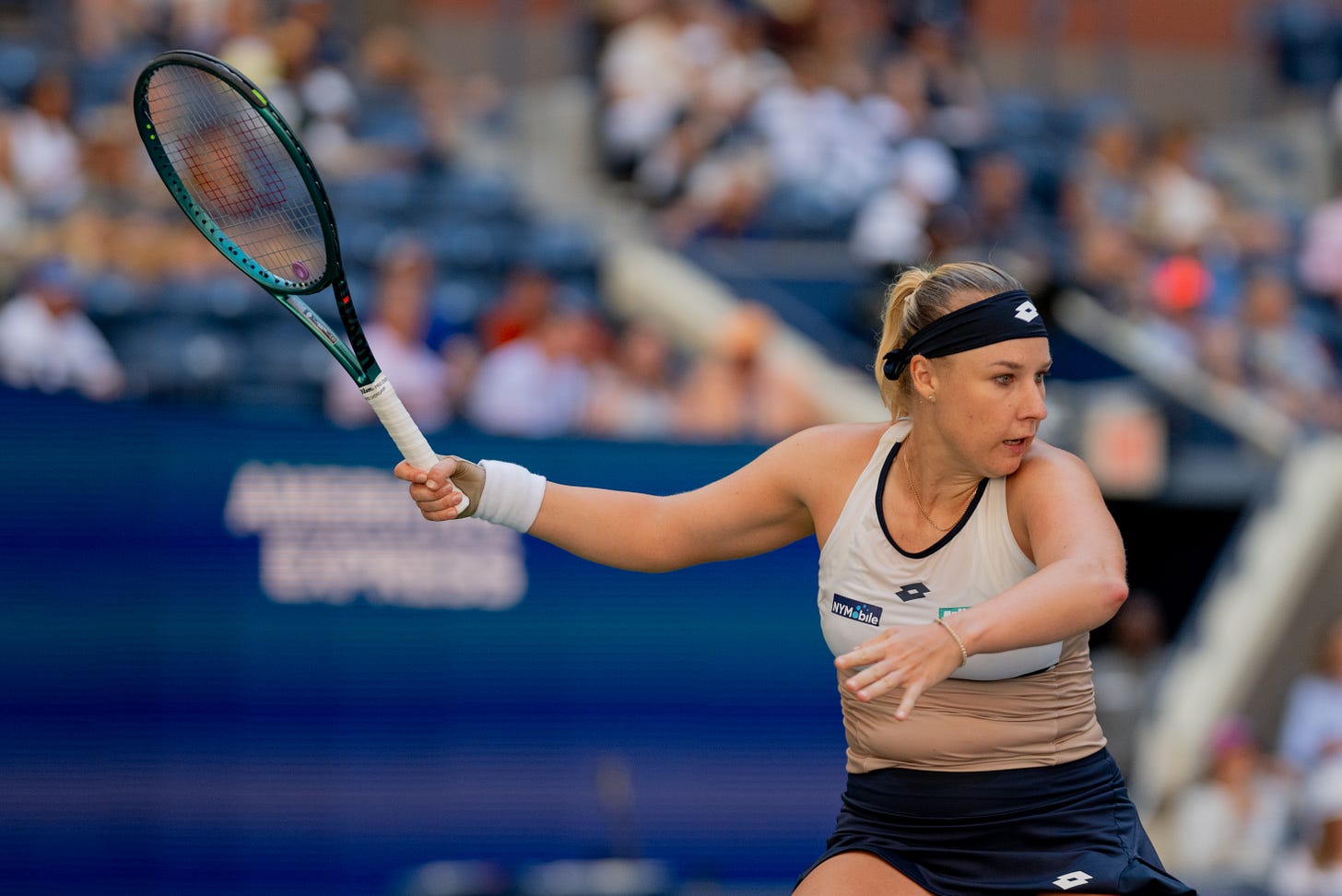
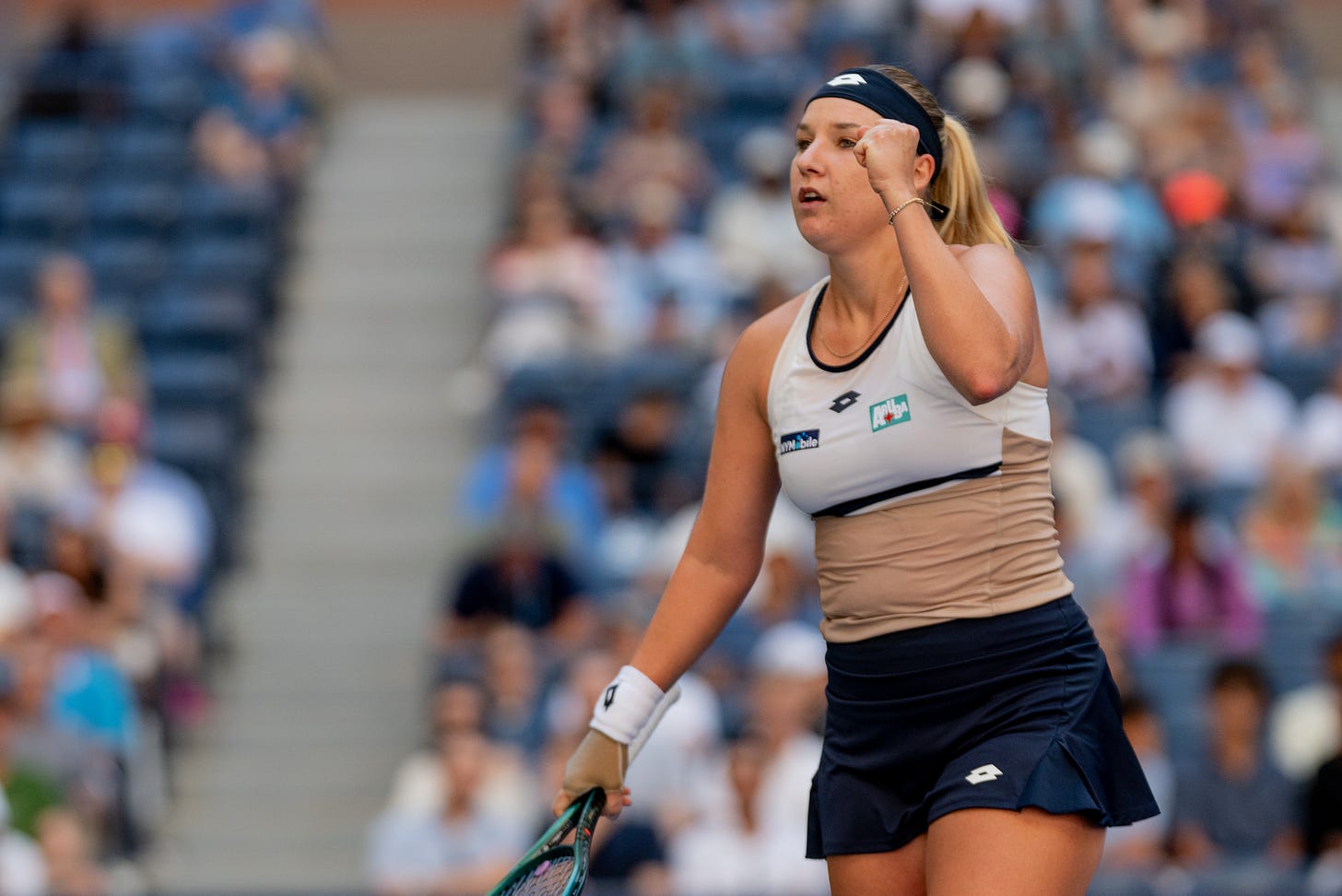
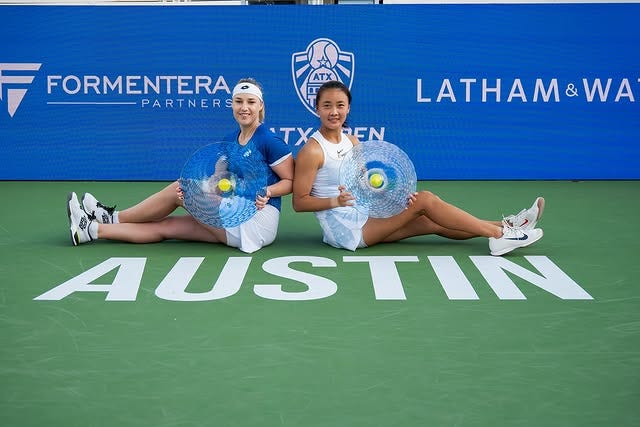
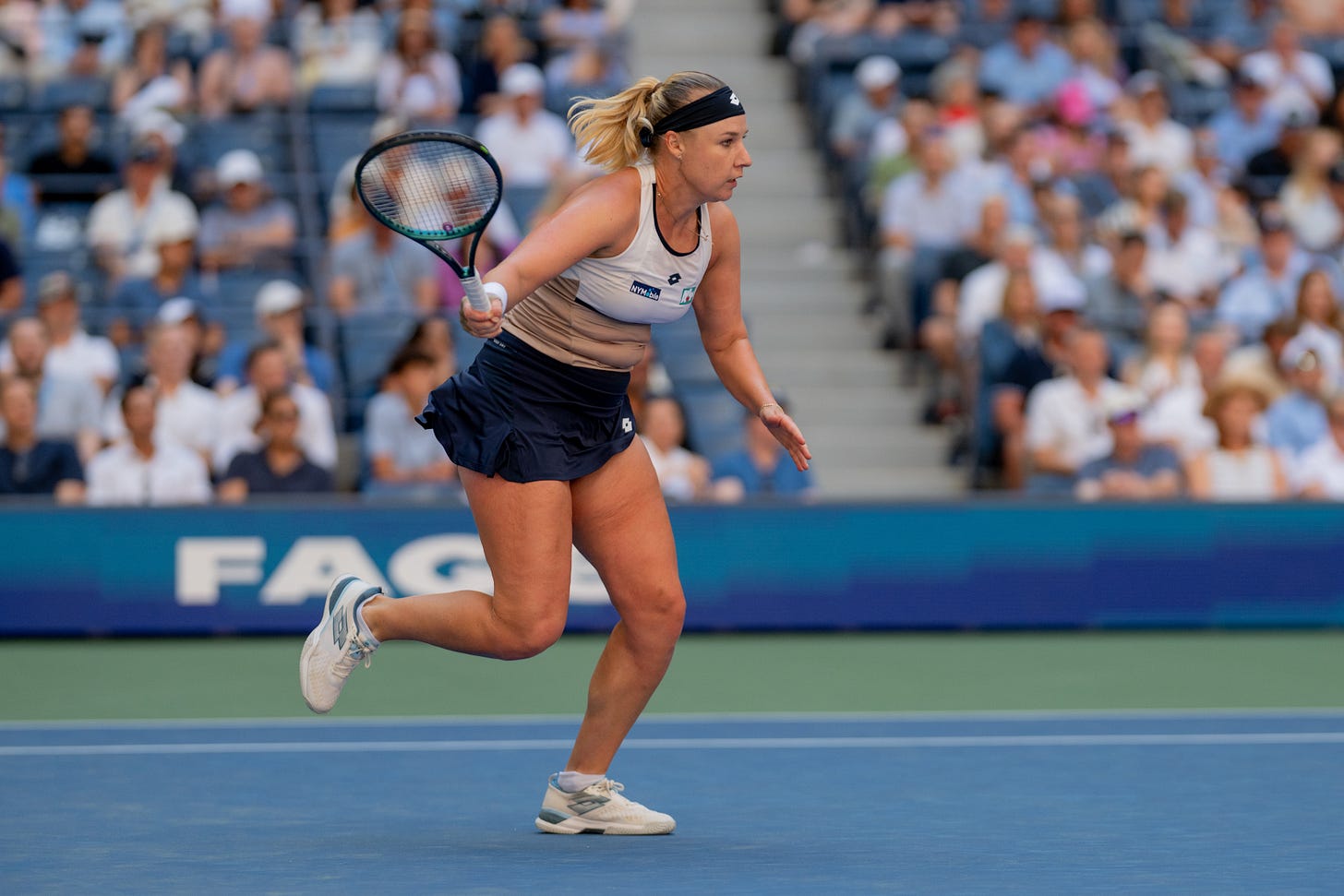
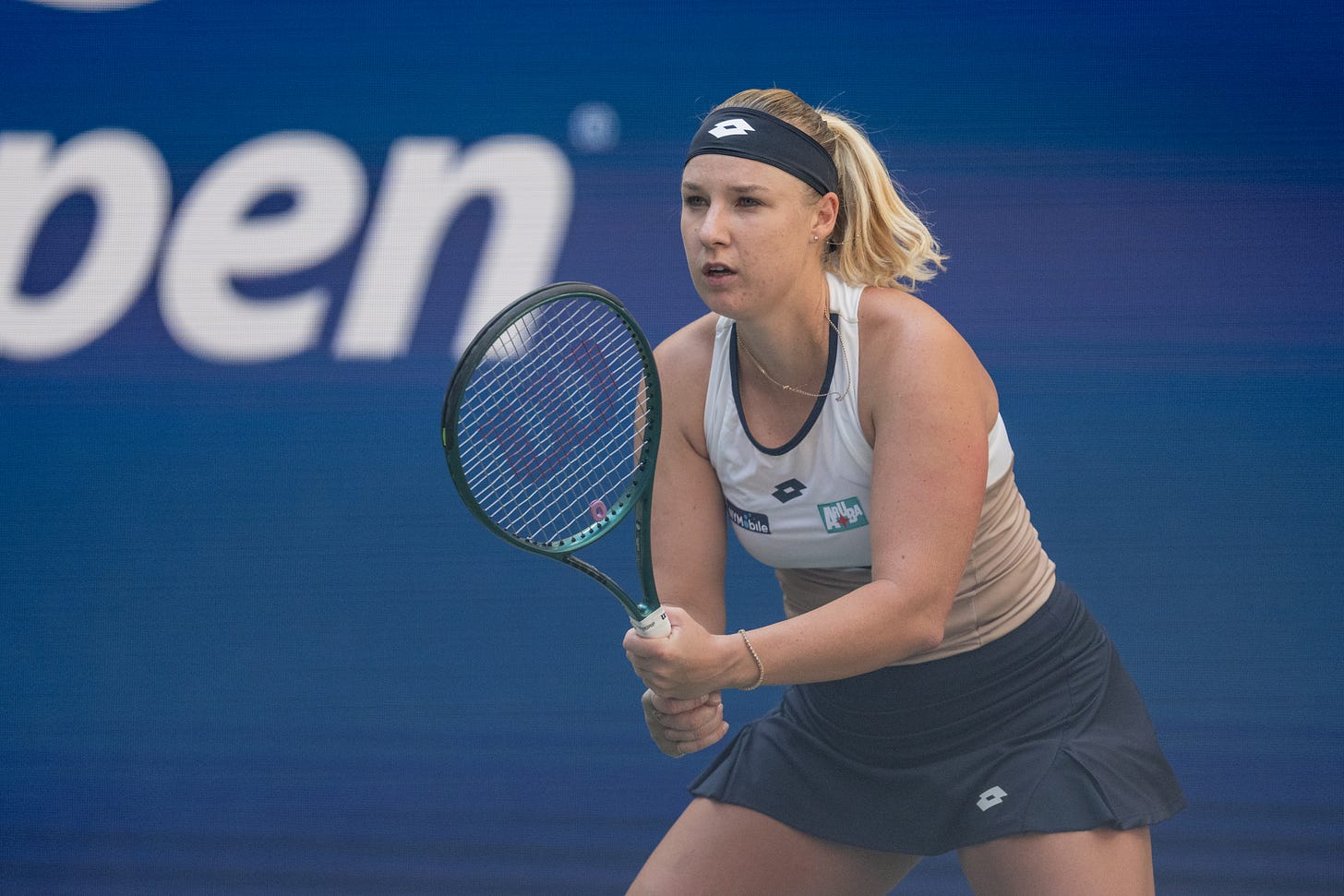
Cool girl. She passed on the French
citizenship question when I asked it as well.
Good for her. She sounds like such an interesting person.
When on tour, Roger Federer loved traveling with Mirka. They would see the sites, go to concerts and plays (Hamilton!), etc. I think he studied Chinese a little one year when he was on the Chinese swing.
Thanks for the great article!